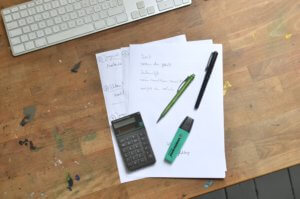How to create a budget and actually follow it
Managing personal finances is definitely not an easy task, but it is one that we need to tackle. The key aspects are to have a clear idea of our income and to be aware of what we are spending it on. Before we pass these stages, finances can be a true chaos. This can prevent us from setting aside money for holidays, saving and investing or even keeping up with covering our expenses. If we manage to create a quality budget, we will also be able to sort out this chaos and be more confident in our finances.
Why do we experience difficulties when budgeting ?
For many people, sticking to a budget is not an easy task. There are many reasons for this. The main one is that people often associate budgeting with restrictions and cutbacks. And this can make it hard to resist spending, can lead us to buy things that look attractive but that we don’t really need. Certainly, allowing ourselves to occasionally buy a nice piece of clothing or dine out doesn’t mean we’ve failed and should abandon all our plans to economize. The important point is to find the balance. And that’s why we need to create an accurate budget so that we have a realistic idea of how much we’re spending. And most importantly to distribute our income by prioritizing our expenses.
How to build our budget ?
The most important part is to begin and it is not that difficult. Take a piece of paper and a pencil and arm yourself with some patience. If you prefer digital formats, Excel spreadsheets will do the trick. After that, just follow the steps.
Determine your income
The first step is to write down your income type. Such as salary, commission, pension, scholarship, rent, pocket money, etc. Then also note down their sources (employer, academic institution, parents, etc.) and whether this income is permanent or occasional. When you have the full amount of your income, you can move on to the next step.
Divide your expenses into 3 categories
- In the first one, note mortgage or consumer loan payments, if any.
- In the second, put all recurrent expenses. These are, for example, rent, electricity bills, water bills, insurance, transport, telephone and internet charges. These are the things you spend on every month and are essential to maintaining a regular lifestyle. Accordingly, it will be harder to reduce them, but also more efficient. For example, you can look for a more economical internet or telephone subscription.
- In the third category, write down all variable expenses, such as dining out, shopping for the home, clothing, entertainment, fuel, gifts, etc. It is natural for these to be different for each month and sometimes unpredictable. But that also makes them more easily influenced. A good trick is to set aside a budget for dinners out, for example, and if it runs out in the middle of the month, you know that by the end of the month it will be better to try to prepare meals at home.
- Bonus tip : set up a separate category for unexpected expenses like home or car repairs or medical fees. This will be your rainy day and emergency fund. Experts advise that this fund should be 6 to 12 times the amount of your salary, but the exact amount is strictly individual. The most important thing is to have this money in an accessible place, like your bank account, and be able to withdraw it in an emergency.
Calculate the final result
Once you’ve listed your revenues and expenses, do a simple calculation. Add up all your income and subtract your expenses.
- After doing the math, if you get a positive result, it means you can afford to move some of your income into a different category. Such as vacations and trips, investing in different assets or just a fund to save money.
- However, if it turns out that your expenses are exceeding your income, you’ll need to take another look at your variable spending and try to deprive yourself of some of it. Another option is to look for alternative ways to increase your earnings.
Once you get this far, you’ve already finished the tough part. You can visualize your finances clearly and have an accurate budget built up. Be sure to update your spreadsheet as changes occur. When you have a clear picture of where your money is going, it will become easier to estimate where it’s worth spending it. This will give you that much needed balance and control over your finances.



